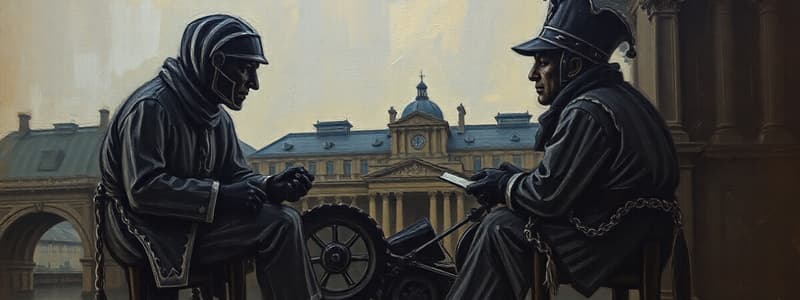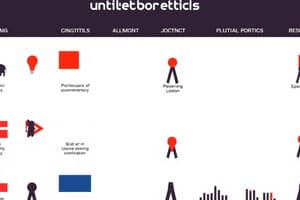Podcast
Questions and Answers
How does the study of International Relations (IR) help individuals to better understand global complexity?
How does the study of International Relations (IR) help individuals to better understand global complexity?
By providing frameworks and tools to analyze interactions between states, international organizations, and non-state actors, and by examining global issues from multiple perspectives.
Why is the study of international relations increasingly multidisciplinary?
Why is the study of international relations increasingly multidisciplinary?
Global issues are complex and require insights from various fields like social sciences, humanities, psychology, economics, and history to fully understand them.
In what key areas do domestic politics and international relations differ?
In what key areas do domestic politics and international relations differ?
Communities, Rules, Economic Structure, Interests, Goals, Conflict, Governance and Power.
What distinguishes territorial communities from non-territorial communities in the context of international relations?
What distinguishes territorial communities from non-territorial communities in the context of international relations?
How do formal and informal rules shape interactions in global politics?
How do formal and informal rules shape interactions in global politics?
How did the internationalized economy (1500-1971) differ from the globalized economy (1971-present)?
How did the internationalized economy (1500-1971) differ from the globalized economy (1971-present)?
How is conflict defined in the context of domestic politics, and how does this definition extend to international relations?
How is conflict defined in the context of domestic politics, and how does this definition extend to international relations?
How does the concept of governance differ between domestic politics and international relations, considering the absence of a world government?
How does the concept of governance differ between domestic politics and international relations, considering the absence of a world government?
Explain the relational nature of power in international relations.
Explain the relational nature of power in international relations.
Differentiate between hard power and soft power, providing examples of resources associated with each.
Differentiate between hard power and soft power, providing examples of resources associated with each.
Flashcards
Territorial Communities (IR)
Territorial Communities (IR)
Territorial communities are political entities that exercise authority within defined geographical boundaries.
Non-territorial communities (IR)
Non-territorial communities (IR)
Non-territorial communities in IR consist of groups such as NGOs, multinational corporations, and international organizations.
Formal vs Informal Rules (IR)
Formal vs Informal Rules (IR)
In global politics, formal rules are written agreements, treaties, and international laws; informal rules are unwritten understandings and norms.
Internationalized Economy (1500-1971)
Internationalized Economy (1500-1971)
Signup and view all the flashcards
Globalized Economy (1971-present)
Globalized Economy (1971-present)
Signup and view all the flashcards
Classic Interests (IR)
Classic Interests (IR)
Signup and view all the flashcards
Governance (Domestic)
Governance (Domestic)
Signup and view all the flashcards
Global Governance (IR)
Global Governance (IR)
Signup and view all the flashcards
Natural Power
Natural Power
Signup and view all the flashcards
Soft Power
Soft Power
Signup and view all the flashcards
Study Notes
Introducing International Relations
- International Relations (IR) significantly impacts individuals and the world at large.
- Studying IR involves grappling with global complexity and understanding its multifaceted nature.
Learning Objectives
- Analyze the direct and indirect effects of global politics.
- Understand the differences between Domestic Politics and International Relations.
- Discuss the intricacies of global politics in a historical context.
- Understand the evolving types and roles of global actors.
Interdisciplinary Nature of International Relations
- IR draws from multiple fields including social sciences, humanities, and psychology.
- Academic IR seeks to understand global issues.
- Applied IR uses knowledge to address global problems.
- Source disciplines include political science, history, and economics.
Domestic Politics vs. International Relations
- Domestic issues and international issues exist on different spheres.
- There are key concepts when contrasting domestic politics with IR.
- These concepts include: communities, rules, economic structure, interests, goals, conflict, governance, and power.
Communities in Domestic and International Politics
- Domestic politics involves organizing human beings into communities.
- This includes the concepts of inclusion and exclusion.
- Obvious communities include people living in a particular territory under a common government.
- Humans also organize into non-territorial communities.
- IR also contains territorial communities.
- Non-territorial communities exist within IR as well.
- Key actors exist in the international community.
Rules in Domestic and International Politics
- Domestic politics rules are domestic law, conventions, and norms.
- All communities have rules, including rules about how the rules are made.
- A hierarchy of rule-making powers exists, with territorial communities superseding non-territorial communities.
- At the apex of this hierarchy is the state.
- Global Politics has informal and formal rules.
- Informal rules include unwritten understandings and agreed-upon taboos.
- These rules are numerous and varied.
- The volume of transactions like trade and migration could not be sustained without embedded rules.
- Informal rules often become formalized as written rules, like consular protection
- Formal rules in IR are called international law.
Economic Structure in Domestic and International Politics
- Economic structure, a subset of rules, needs independent study.
- The domestic economies are heavily dependent on rule-making that determine what has value.
- Rule-making dictates economic relationships, how markets, wealth is generated/distributed and taxation.
- The global economy has evolved greatly over time.
- The localized economy (pre-history to 1500) operated as self-contained systems of barter exchange.
- Interaction between localized economies was limited.
- The internationalized economy (1500-1971) formed a marketplace connecting the world's economies.
- The Globalized Economy (1971-present) features wealth creation elements (finance, investment, etc) on a global basis.
Interests, Goals, and Conflict in Domestic and International Politics
- Politics is about the conflict over the rules governing a community.
- Conflict refers to an incompatibility between individual's interests and goals in a community.
- In International Relations, classic interests are security, gain, and reputation.
- Other interests include independence, justice, and community.
- Pursuing these goals often leads to a clash of interests.
Governance in Domestic and International Politics
- Domestic governance involves establishing rules for the community.
- This includes making allocative decisions as a whole, settling conflicts, mediating in disputes and the exercise of authority.
- There is no world government in international relations.
- There is global governance, the sum of how individuals and institutions manage their affairs is a continuing process
- Conflicting and diverse interests are accommodated and cooperative action may be taken.
- This includes formal institutions and informal arrangements that people find have either agreed to or perceive to be in their interest.
Power in Domestic and International Politics
- The key components of power in domestic politics are influence, coercion, and authority.
- Hans Morganthau stated international politics, like all politics, is a struggle for power to achieve the immediate aim.
- J. William Fulbright viewed power as something that confuses itself with virtue and assumes a great nation has the means to do God's work.
- Power is recognized and respected, though its ingredients are hard to define.
- Power is a means to an end, acting as the primary objective of domestic and international political processes.
- Power is relational, dependent on the situation/context it is used in.
- The power of A = the ability of A to get B to take action X minus the probability that B would take action X anyway (Robert Dahl).
Ingredients of Power
- Natural power are the resources available to a nation like its geography, natural resources and population.
- Enhanced, modified and constrained by Hard and Soft Power
- Hard power consists of industrial development, available finances, and the size of a state's military capabilities.
- Soft power includes national unity, public support, a positive international image, and effective leadership.
Effects of Soft Power
- Country A influences Country B.
- Country B changes its attitudes toward Country A.
- Country A changes its behavior toward Country B.
Additional Notes on Power in International Relations
- Power conversion is the capacity to change potential power based on the changed behavior of others.
- Understanding a country's skill in power conversion is important for predicting outcomes.
- France and Britain’s greater amount of tanks was nullified by Hitler's better strategy in 1940.
- Influence, coercion, and authority play a role.
Foreign Policy in Democratic States
- Legislative, executive, and judicial branches influence foreign policy, with key influencing actors.
- These actors are individuals, intergovernmental organizations, embassies, NGOs and bussinesses.
- International events also play a key role in foreign policy.
Studying That Suits You
Use AI to generate personalized quizzes and flashcards to suit your learning preferences.
Related Documents
Description
Explore the impact of International Relations (IR) on individuals and the world. This lesson covers the complexities of global politics, differences between domestic and international politics, and the roles of global actors. It also examines the interdisciplinary nature of IR, drawing from social sciences, humanities, and psychology.




